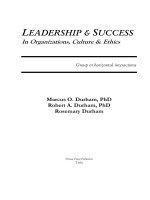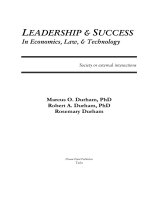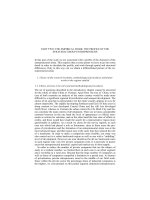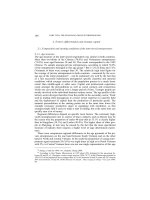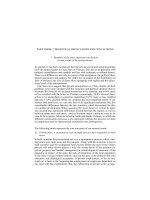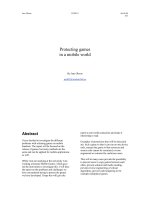Tài liệu Emerging Issues in International Business Research docx
Bạn đang xem bản rút gọn của tài liệu. Xem và tải ngay bản đầy đủ của tài liệu tại đây (932.95 KB, 308 trang )
Emerging Issues in International Business
Research
NEW HORIZONS IN INTERNATIONAL BUSINESS
Series Editor: Peter J. Buckley
Centre for International Business,
University of Leeds (CIBUL), UK
The New Horizons in International Business series has established itself as the world’s
leading forum for the presentation of new ideas in international business research. It
offers pre-eminent contributions in the areas of multinational enterprise – including
foreign direct investment, business strategy and corporate alliances, global competitive
strategies, and entrepreneurship. In short, this series constitutes essential reading for
academics, business strategists and policy makers alike.
Titles in the series include:
Globalizing America
The USA in World Integration
Edited by Thomas L. Brewer and Gavin Boyd
Information Technology in Multinational Enterprises
Edited by Edward Mozley Roche and Michael James Blaine
A Yen for Real Estate
Japanese Real Estate Investment Abroad – From Boom to Bust
Roger Simon Farrell
Corporate Governance and Globalization
Long Range Planning Issues
Edited by Stephen S. Cohen and Gavin Boyd
The European Union and Globalisation
Towards Global Democratic Governance
Edited by Brigid Gavin
Globalization and the Small Open Economy
Edited by Daniel Van Den Bulcke and Alain Verbeke
Entrepreneurship and the Internationalisation of Asian Firms
An Institutional Perspective
Henry Wai-chung Yeung
The World Trade Organization in the New Global Economy
Trade and Investment Issues in the Millennium Round
Edited by Alain M. Rugman and Gavin Boyd
Japanese Subsidiaries in the New Global Economy
Edited by Paul W. Beamish, Andrew Delios and Shige Makino
Globalizing Europe
Deepening Integration, Alliance Capitalism and Structural Statecraft
Edited by Thomas L. Brewer, Paul A. Brenton and Gavin Boyd
China and its Regions
Economic Growth and Reform in Chinese Provinces
Edited by Mary-Françoise Renard
Emerging Issues in International Business Research
Edited by Masaaki Kotabe and Preet S. Aulakh
Emerging Issues in
International Business
Research
Edited by
Masaaki Kotabe
Preet S. Aulakh
Temple University, USA
Edward Elgar
Cheltenham, UK • Northampton, MA, USA
NEW HORIZONS IN INTERNATIONAL BUSINESS
Typeset by Manton Typesetters, Louth, Lincolnshire, UK.
Printed and bound in Great Britain by MPG Books Ltd, Bodmin, Cornwall.
© Masaaki Kotabe and Preet S. Aulakh 2002
All rights reserved. No part of this publication may be reproduced, stored in a
retrieval system or transmitted in any form or by any means, electronic, mechanical
or photocopying, recording, or otherwise without the prior permission of the pub-
lisher.
Published by
Edward Elgar Publishing Limited
Glensanda House
Montpellier Parade
Cheltenham
Glos GL50 1UA
UK
Edward Elgar Publishing, Inc.
136 West Street
Suite 202
Northampton
Massachusetts 01060
USA
A catalog record for this book
is available from the British Library
Library of Congress Cataloging in Publication Data
Emerging issues in international business research / edited by Masaaki Kotabe and
Preet S. Aulakh.
p. cm. — (New horizons in international business series)
“The Institute of Global Management Studies (IGMS) at the Fox School of
Business and Management, Temple University sponsored the inaugural
International Business Research Forum on ‘Emerging Issues in International
Business Research’ during April 7-8, 2000 … at the Fox School”—Frwd.
Includes index.
1. International trade—Research—Congresses. 2. Business—Research—
Congresses. 3. Foreign trade promotion—Research—Congresses. 4. International
business enterprises—Research—Congresses. I. Kotabe, Masaaki. II. Aulakh,
Preet S., 1962– III. International Business Research Forum on ‘Emerging Issues
in International Business Research’ (2000 : Fox School) IV. New horizons in
international business.
HF1372 .E44 2002
382—dc21
2001051075
ISBN 1 84064 836 8
v
Contents
List of figures vii
List of tables viii
List of boxes ix
List of contributors x
Forew ord M. Moshe Porat xvii
Forew ord Arvind Phatak xviii
Preface xx
1. International business research: from functional to issue-based
focus 1
Masaaki Kotabe and Preet S. Aulakh
PART I THE MACRO-ENVIRONMENT
2. Regional integration and foreign direct investment: theory and
lessons from NAFTA 15
Lorraine Eden
3. Intellectual property rights and international business 37
Subhash C. Jain
4. Global financial markets and global firms: implications for
international business research 65
Jongmoo Jay Choi
5. Cultural Balkanization and hybridization in an era of
globalization: implications for international business research 81
Bryan W. Husted
PART II INTERFACES BETWEEN BUSINESS AND INSTITUTIONS
6. Emerging issues in MNC–host government relations in
developing countries 99
Ravi Ramamurti
7. National export promotion: A statement of issues, changes, and
opportunities 123
Michael R. Czinkota
8. Industrial endowments in international business: an analytical
framework 140
Yadong Luo
9. Business groups and economic development: a resource-based
view 163
Mauro F. Guillén
PART III STRATEGY AND COMPETITION
10. Globalization of firms: strategies and outcomes 201
Saeed Samiee
11. Entering foreign markets through strategic alliances and
acquisitions 223
Michael A. Hitt and Klaus Uhlenbruck
12. Towards a research agenda on hybrid organizations: R&D,
production and marketing interfaces 241
Xavier Martin
13. The Internet and international business: a cross-regional study 260
Indrajit Sinha and Yaniv Gvili
Index 273
vi Contents
vii
Figures
3.1 Differing views on intellectual property protection 50
6.1 Bargaining model of MNC–host government relations 104
6.2 Liberalization of FDI policies of developing countries:
subjective characterization of trends 107
6.3 Two-tier bargaining model 108
8.1 An integrated framework of industry selection 157
12.1 Functional interfaces within a firm 243
12.2 Functional interfaces between firms 246
12.3 Functional scope of 389 alliances among international
airlines, 1982–94 248
13.1 Online shopping: relative importance of low price 264
13.2 Online shopping: relative importance of reputation 265
13.3 Online shopping: relative importance of convenience 265
13.4 Online shopping: relative importance of service 267
13.5 Online shopping: relative importance of branding 267
13.6 Percentage agreeing that prices are lower on the Internet 268
13.7 Percentage expected discount on the Internet 268
13.8 Difficulty in buying from another country’s sites 269
13.9 Need fulfillment by domestic e-tailers relative to US sites 269
13.10 Product selection of domestic e-tailers relative to US sites 270
13.11 Quality of ‘deals’ offered by domestic e-tailers relative to
US 270
13.12 Likelihood of shopping online 271
viii
Tables
3.1 Losses suffered by US industries resulting from intellectual
property inadequacies, 1986 44
3.2 International intellectual property rights protection: regime
deficiencies 46
3.3 Major enforcement deficiencies 47
3.4 Effect of patent protection on inventions, 1981–83 52
3.5 Social and private rates of return from investment in innovation 53
4.1 A valuation framework 68
9.1 The effect of foreign trade and investment flows on business
groups in emerging economies 171
9.2 Cross-sectional sample descriptive statistics and correlation
coefficients 183
9.3 OLS regression results of the top ten business groups in 1995
on various characteristics of nine emerging countries, 1995 184
9.4 OLS regression results of the top ten business groups in 1995
on various characteristics of nine emerging countries, 1990 185
9.5 The top 100 non-financial firms in South Korea, Spain, and
Argentina in 1975 and 1995, by organizational form 187
9.6 Saturated log-linear model of the largest 100 non-financial
firms in South Korea, Spain, and Argentina by form of control
and year 189
10.1 International sales and growth patterns among leaders in the
appliance industry, 1986–98 216
10.2 Relationship between industry environment and firm-level
globalization initiatives 217
12.1 Correlations among dimensions of supplier influence 253
ix
Boxes
1.1 Shift in international business research 2
x
Contributors
Preet S. Aulakh is Washburn Research Fellow and Associate Professor of
Strategy and International Business at the Fox School of Business and Man-
agement, Temple University. He received his PhD from the University of
Texas at Austin. Prior to joining Temple University, he taught at Michigan
State University and Memorial University in Canada. He is the editor of
Journal of International Management. His co-edited book, Rethinking
Globalization(s): From Corporate Transnationalism to Local Interventions
(with Michael Schechter) was published by Macmillan Press in 2000. In
addition, he has published numerous articles on foreign entry modes, interna-
tional alliances, technology licensing, and international strategies of emerging
economy firms in journals such as Academy of Management Journal, Journal
of International Business Studies, Journal of Marketing, Journal of the Acad-
emy of Marketing Science, Industrial Marketing Management, Journal of
World Business, Journal of International Marketing, among others.
Jongmoo Jay Choi is Laura H. Carnell Professor of Finance and International
Business, a former chair of finance and currently the director of the doctoral
program in international business at Temple University. He received his PhD
from New York University. He previously served on the faculty at Columbia
Business School and as an international treasury economist at Chase Manhat-
tan Bank. He has been a visiting professor at the University of Hawaii, University
of Pennsylvania (Wharton), NYU (Stern), International University of Japan
and the Korea Advanced Institute of Science and Technology. He is a former
president of the Korea–America Finance Association, and a trustee of the
Multinational Finance Society. As an author of over 50 books and articles, he is
an internationally renowned scholar in the area of international finance and
investments, exchange risk management, and emerging market finance. He is
an editor of a book series, International Finance Review (JAI/Elsevier), a
section editor of Journal of Economics and Business, and editorial board mem-
ber for five other journals. He is a recipient of the Musser Award for Excellence
in Leadership and Distinguished Faculty Research Fellowship at Temple.
Michael R. Czinkota is Professor of Marketing and International Business
Strategy at the School of Business, Georgetown University. He received his
PhD from Ohio State University. Prior to joining Georgetown he was a
deputy assistant secretary at the Department of Commerce. He served as head
of the US delegation to the OECD industry committee and as senior trade
advisor for export controls. Professor Czinkota has consulted with AT&T,
IBM, General Electric and Nestlé, and has assisted various governmental
organizations in effective trade promotion policies. He is the senior author of
two college textbooks, International Marketing (2001) and International Busi-
ness (1999). His other publications include Export Policy (1982), Unlocking
Japan’s Market (with J. Woronoff, 1991) and The Global Marketing Impera-
tive (with I. Ronkainen and J. Tarrant, 1995). He was listed in the Journal of
International Business Studies (1994) as one of the three most productive
contributors to international business research.
Lorraine Eden is Associate Professor of Management at Texas A&M Univer-
sity. Her research on multinational enterprises centers on transfer pricing and
international taxation, regional integration, and MNE–state relations. Recent
honors include a Texas A&M University Former Students Association Award
for Excellence in Faculty Teaching (2000), Who’s Who in International Busi-
ness Education and Research (1999), US–Canada Fulbright Research Fellowship
(1992–93), and Pew Faculty Fellowship in International Affairs (1991–92). She
founded the Women Economists Network in Canada, has been Vice President
of the Canadian Economics Association, and President and Program Chair of
the International Political Economy Section of the International Studies Asso-
ciation. She is currently Vice President and 2002 Program Chair for the Academy
of International Business. She has authored and/or edited five scholarly books:
Multinationals and Transfer Pricing (with Alan Rugman, 1985); Retrospectives
on Public Finance (1991); Multinationals in the Global Political Economy
(with Evan Potter, 1993); Multinationals in North America (1994); and Taxing
Multinationals: Transfer Pricing and Corporate Income Taxation in North
America (1998). In addition, she has published more than 50 refereed journal
articles and book chapters, including articles in Academy of Management Jour-
nal, Accounting, Organizations and Society, Asian Survey, Canadian Journal of
Economics, Government and Policy, International Executive, International Trade
Journal, Journal of International Business Studies, Journal of International
Management, Millennium, and Transnational Corporations.
Mauro F. Guillén is on the faculty at the Wharton School and Department of
Sociology of the University of Pennsylvania, where he teaches multinational
management. He previously taught at the MIT Sloan School of Management.
He received a PhD in sociology from Yale University and a doctorate in
political economy from the University of Oviedo in his native Spain. His
latest book is The Limits of Convergence: Globalization and Organizational
Contributors xi
Change in Argentina, South Korea, and Spain (2001). He is also the author of
Models of Management (University of Chicago Press, 1994), and, with Charles
Perrow, The AIDS Disaster (Yale University Press, 1990). In Spanish, he has
published La Profesión de Economista (Ariel, 1989), and Análisis de Regresión
Múltiple (CIS, 1992). His research has appeared in Academy of Management
Journal, American Sociological Review, Annual Review of Sociology, Admin-
istrative Science Quarterly, East Asian Economic Perspectives, Industrial &
Corporate Change, Industrial & Labor Relations Review, Journal of Latin
American Studies, Management Science, Trends in Organizational Behavior,
and Sloan Management Review. He has been quoted in the Los Angeles
Times, International Herald Tribune, and Journal of Commerce, as well as in
several Argentine and Spanish newspapers and magazines. He is a former
Guggenheim Fellow and Member in the Institute for Advanced Study in
Princeton.
Yaniv Gvili is a doctoral student of marketing at the Fox School of Business
and Management, Temple University. He received his BSc in industrial engi-
neering and management from Ben Gurion University, Beer Sheva, Israel,
and an MBA from Bar Ilan University, Ramat Gan, Israel. His areas of
interest are e-commerce, distribution of online information services, and
communications networks for application service providers (ASPs). Prior to
joining the doctoral program at Temple University, he held the position of
manager of research and information system analysis in a major advertising
agency. In addition, Yaniv Gvili has consulted with Spacenet, Inc. (a Gilat–
General Electric company) in the areas of CRM-SFA information systems,
and business development in the field of satellite communications networks.
Michael A. Hitt is a Professor of Management and holds the Weatherup/
Overby Chair in Executive Leadership at Arizona State University. He received
his PhD from the University of Colorado. He has authored or co-authored
several books and book chapters and numerous journal articles in such journals
as the Academy of Management Journal, Academy of Management Review,
Strategic Management Journal, Journal of Applied Psychology, Organization
Studies, Journal of Management Studies, and Journal of Management, among
others. His recent publications include three books, Downscoping: How to
Tame the Diversified Firm (1994), Strategic Management: Competitiveness and
Globalization (2001), and Mergers and Acquisitions (2001). He is co-editor of
four recent books, Managing Strategically in an Interconnected World (1998),
New Managerial Mindsets: Organizational Transformation and Strategy Im-
plementation (1999), Dynamic Strategic Resources: Development, Diffusion
and Integration (2000), and Winning Strategies in a Deconstructing World
(2001). He has served on the editorial review boards of multiple journals
xii Contributors
including the Academy of Management Journal, Academy of Management
Executive, Journal of Applied Psychology, Journal of World Business, and
Journal of Applied Behavioral Sciences. Furthermore, he has served as consult-
ing editor (1988–90) and editor (1991–93) of the Academy of Management
Journal.
Bryan W. Husted currently holds a joint appointment as Professor of Man-
agement at the Instituto Tecnológico y de Estudios Superiores de Monterrey
(Mexico) and Alumni Association Chair of Business Ethics at the Instituto de
Empresa (Spain). He received a PhD from the University of California at
Berkeley and a JD from Brigham Young University. He serves as Executive
Secretary of the Business Association for Latin American Studies. He is an
active member of the Academy of Management, International Association for
Business and Society, the European Business Ethics Networks, the Society
for Business Ethics, and the International Society for Business, Economics,
and Ethics. He is also a member of the editorial board of the Journal of
International Management. He is a national researcher of the National Sys-
tem of Researchers of Mexico. His research focuses on cross-cultural business
ethics and corporate social and environmental performance. His work has
appeared in such journals as the Journal of International Business Studies,
Business Ethics Quarterly, Business and Society, Journal of Business Ethics,
Growth and Change, and Journal of Environment and Development.
Subhash C. Jain is Professor of Marketing, Director, Center for International
Business Education and Research (CIBER) and Director, GE Capital Global
Learning Center (GECGLC) at the University of Connecticut, School of Busi-
ness Administration. He received his PhD from the University of Oregon. Dr
Jain is the author of more than 100 publications, including articles in the
Journal of Marketing Research, Journal of Marketing, Journal of Economic
Abstracts, Long Range Planning, Journal of Applied Psychology, Columbia
Journal of World Business, Journal of International Marketing, International
Business Review, and others. He is the author of several books including
Marketing Planning and Strategy, 6th edition (2000), International Marketing
Management, 6th edition (2000), Export Strategy, and Market Evolution in
Developing Countries (1989). He has been a member of the editorial review
boards of the Journal of Marketing, Journal of the Academy of Marketing
Science, Journal of International Marketing, Journal of Global Marketing, and
others. He also offers seminars for the International Trade Center (WTO/
UNCTAD) in Geneva. He serves as a visiting faculty at the Graduate School of
Business Administration in Zurich in their executive MBA program. Dr. Jain
has advised government agencies in Malaysia, Chile, India, Pakistan, St. Lucia,
Mexico, Iran, Kenya, and Indonesia on their trade problems.
Contributors xiii
Masaaki Kotabe holds the Washburn Chair of International Business and
Marketing, and is Director of Research at the Institute of Global Management
Studies at the Fox School of Business and Management at Temple University.
He received his PhD from Michigan State University. Dr Kotabe also served
as the Vice President of the Academy of International Business in the 1997–
98 period. His research work has appeared in such journals as the Journal of
Marketing, Journal of International Business Studies, and Strategic Manage-
ment Journal. His books include Global Sourcing Strategy: R&D,
Manufacturing, Marketing Interfaces (1992), Japanese Distribution System
(with Michael R. Czinkota, 1993), Anticompetitive Practices in Japan (with
Kent W. Wheiler, 1996), MERCOSUR and beyond (1997), Trends in Interna-
tional Business: Critical Perspectives (with Michael R. Czinkota, 1998),
Japanese Distribution Strategy (with Michael R. Czinkota, 2000), and Global
Marketing Management (with Kristiaan Helsen, 2001). He serves on the
editorial boards of the Journal of Marketing, Journal of International Busi-
ness Studies, Journal of International Marketing, Journal of World Business,
Journal of Business Research, Latin American Economic Abstracts, and
Thunderbird International Business Review. In the 1997 issue of Journal of
Teaching in International Business, Dr Kotabe was ranked the most prolific
international marketing researcher in the world in the last ten years. He has
recently been elected a Fellow of the Academy of International Business for
his significant contribution to international business research and education.
He is also an elected member of the New York Academy of Sciences.
Yadong Luo is Associate Professor of Strategy and International Business at
the University of Miami. Prior to joining UM, he was Associate Professor of
International Management at the University of Hawaii where he was the
recipient of the University of Hawaii Regents’ Medal for Excellence in Re-
search. Before coming to the United States, he served as a government
official in China in charge of international business. He received his PhD
from Temple University. He is the author of over ten books that address
international strategies, international joint ventures, guanxi, and business,
and MNEs in emerging markets. He has also published about 80 journal
articles, in journals including Academy of Management Journal, Journal of
Applied Psychology, Strategic Management Journal, Journal of Manage-
ment, Journal of Management Studies, Organization Science, and Journal of
International Business Studies.
Xavier Martin is Assistant Professor of Management and International Busi-
ness at Stern School of Business, New York University. He received his PhD
from the University of Michigan. Parts of his chapter were written while he
was on the visiting faculty of the Graduate School of Business at Columbia
xiv Contributors
University. His research has appeared in leading publications in management
and international business including Administrative Science Quarterly, Stra-
tegic Management Journal, Research Policy, and Advances in Strategic
Management. His current research addresses the antecedents and consequences
of hybrid interfirm arrangements, including buyer–supplier partnerships and
collaborative alliances. His research also addresses international entry modes
and new product introduction strategies. Among his recent honors and awards
are the Richard N. Farmer Dissertation Competition Award for the best dis-
sertation from the Academy of International Business; the Best International
Paper Award from the Academy of Management; and the Teacher of the Year
Award from the undergraduate division of Stern School of Business at NYU.
Xavier also serves as a reviewer or board member for various scholarly
journals in strategic management and international business.
Ravi Ramamurti is Patrick F. and Helen C. Walsh Research Professor in the
College of Business Administration at Northeastern University and is a visit-
ing professor, in summertime at IMD, Lausanne. He obtained his PhD from
Harvard Business School. He has served on the faculties of Harvard Business
School and MIT’s Sloan School and has been a consultant to several firms,
governments, and international agencies such as the World Bank and the
United Nations. Prior to joining Northeastern University, he served as a
consultant to the planning commission of the government of India, and as
executive assistant to the CEO of a large engineering company. His most
recent book, Privatizing Monopolies, was published by Johns Hopkins Uni-
versity Press (1996). His articles have been published in a number of journals,
including Academy of Management Executive, Academy of Management Re-
view, California Management Review, Harvard Business History Review,
International Executive, International Trade Journal, Journal of General
Management, Journal of International Business Studies, Management Sci-
ence, and World Development.
Saeed Samiee is the Collins Professor of Marketing and International Busi-
ness at the College of Business Administration, the University of Tulsa. He is
the Project Director for the Institute of International Business Education
(IBE), a joint project between the University of Tulsa and Moscow State
Institute of Electronics Technology. He received his PhD from the Ohio State
University. Professor Samiee has conducted research and lectured executives
and academics in the US, Europe, the Middle East, and in the Asia-Pacific
countries. He has also assisted such firms as AT&T, IBM, Merck, NCR,
Sonoco, and Toyota, as well as such non-profit and educational institutions as
the American Dental Association, and Small Business Development Centers
in New Jersey and South Carolina. He has published extensively in several
Contributors xv
scholarly journals and serves on the editorial review boards of the leading
journals in his areas of expertise. Professor Samiee was the sixth most pro-
lific author in international marketing during the 1987–93 period according
to the ranking developed by the Journal of Teaching in International Busi-
ness. He is listed among the 10 and the top 30 most prolific authors in the
Journal of the Academy of Marketing Science and Journal of International
Business Studies, respectively. He was named Outstanding Professor at The
University of South Carolina, selected as an outstanding reviewer by Journal
of the Academy of Marketing Science (1997–2000) and for the Journal of
International Business Studies, and is a member of Beta Gamma Sigma,
National Business Honor Society.
Indrajit (Jay) Sinha is Washburn Research Fellow and Assistant Professor
of Marketing at the Fox School of Business and Management, Temple Uni-
versity. He earned his PhD from the University of Michigan. He has served as
Staff Consultant, Management Consulting, Deloitte & Touche and consulted
to organizations in the local area (including AAMCO and Philadelphia Cham-
ber of Commerce). His articles have appeared or are forthcoming in such
journals as Harvard Business Review, Journal of Marketing Research, Inter-
national Journal of Research in Marketing, Journal of Retailing, and
Psychometrika. He has been quoted in major national newspapers and maga-
zines on topics relating to e-commerce and the Internet. He has received
several recent honors and awards including the Fox School’s MBA Student
Association Award for Dedication to MBA Student Development and the
Marketing Department Outstanding Teaching Award for Excellence in Un-
dergraduate Teaching and Course Development, Temple University.
Klaus Uhlenbruck is Assistant Professor in the Management Department at
Texas A&M University. He received his PhD from the University of Colo-
rado. Previously, he was on the faculty of California State University San
Marcos and has work experience in the computer and consulting industries.
His research focuses on value creation in emerging markets. His scholarly
articles have been published in Academy of Management Journal, Journal of
Business Venturing, Journal of International Business Studies, Journal of
Management Studies, International Journal of Organizational Analysis, and
other periodicals. He published a book in German on service strategies for
manufacturers. Professor Uhlenbruck is a member of the Academy of Inter-
national Business, the Academy of Management, Ciber Cross-Cultural
Collegium (UCLA), and the Strategic Management Society. He serves as
liaison between the Enterpreneurship and International Management Divi-
sions of the Academy of Management.
xvi Contributors
xvii
Foreword
M. Moshe Porat, Dean, the Fox School of Business
and Management, Temple University
It is my pleasure to add a Foreword to this book on emerging issues in
international business.
We have witnessed rapid changes worldwide driven by telecommunica-
tion, information technology, biotechnology and the forces of enterpreneurship
and innovation. These changes are global in nature and therefore the issues
and solutions require a global approach. This book is an important contribu-
tion in this direction.
I am very proud of the team of researchers assembled in the Fox School of
Business and Management under the umbrella of the Institute of Global
Management Studies. Our goal is to help them to become the forefront for
thought and scholarship in international business education within the school
and across the nation. The Journal of International Management, the Annual
Research Forum, the Annual Spring Conference and other academic and
practitioner-oriented efforts are just a sample of such activities.
I commend Professors Kotabe and Aulakh for their foresight and Professor
Phatak for spearheading this effort.
xviii
Foreword
Arvind Phatak, Executive Director, The Institute of
Global Management Studies, Temple University
The Institute of Global Management Studies (IGMS) at the Fox School of
Business and Management, Temple University sponsored the Inaugural Inter-
national Business Research Forum on ‘Emerging Issues in International
Business Research’ during 7–8 April 2000. The purpose of this annual forum
was to bring together leading scholars of international business at the Fox
School in order to open a dialogue as to the current status and future direction
of the discipline. The inauguration of an international business forum of this
nature is quite timely, because new international business structures and
strategies are bound to emerge as the new millennium dawns upon us with
opposing forces of market globalization and re-emergence of nation-states
shaping the world economy. Traditional international business paradigms
lose their power, displaced by emerging ones. International business research
is at a historic turning point.
I would like to congratulate Professors Masaaki Kotabe and Preet Aulakh
of Temple University for organizing such an important forum at the Fox
School. At this forum, key international business researchers engaged in a
candid, non-confrontational discussion on the status and future of interna-
tional business research. The output of this forum was thoughts and guidelines
for future developments in international business research.
I am sure that the reader will find chapters in this book rigorous yet
insightful and useful for better understanding of various issues facing inter-
national business researchers.
A primary mission of the IGMS is to promote cutting edge international
business research, which we hope to achieve in some measure by annually
hosting the International Business Research Forum. I thank all eminent scholars
who presented and contributed papers at the inaugural research forum, and
for their dedication to the pursuit of new insights into the dynamic nature of
international business. I hope that the papers in this book will stimulate new
avenues for research in the international business field. It is the passion of
Dean Moshe Porat for international business education and research that led
to the establishment of the IGMS and of the Annual International Business
Research Forum. I speak for all international business faculty in the Fox
School in thanking him for his generous support.
Forewo rd xix
xx
Preface
The phenomenon of globalization has captured the popular imagination in
the last decade or so. This is reflected in numerous books published on this
topic from various academic disciplines and across philosophical discourses.
In discussing the various facets of globalization, almost all discourses con-
sider the role of business and/or multinational corporations to be very salient
in either enhancing this phenomenon or managing the process of globaliza-
tion. Thus, to international business scholars, globalization poses unique
challenges in terms of analyzing the appropriateness of existing models and
paradigms to the new external reality as well as incorporating the changes
due to the integrated world economy into new theoretical and normative
frameworks.
In light of this challenge, the Institute of Global Management Studies at
the Fox School of Business and Management, Temple University, sponsored
an International Business Forum during 7–8 April 2000, under the title,
‘Emerging Issues in International Business Research’. The purpose of this
forum was to bring together both leading scholars and young rising stars in
international business studies in order to open a dialogue as to the current
status and future direction of the discipline as it confronts the challenges of
globalization. Three broad themes (macro-environment, business–institution
interfaces, and strategy and competition) provided the framework of this
research forum, and thus that of this book.
Each invited scholar was asked to prepare a paper on one topic within the
broad theme that not only discusses the state of the current knowledge on that
topic but also provides insights into the specific emerging aspects within that
topic that need to be researched. After the research forum, the authors were
asked to revise their papers to incorporate the issues emanating from forum
discussions. The 12 chapters in this book, organized in three parts, are a
result of the research forum and the subsequent revisions. It was our desire
that the set of papers in this book collectively provide a new research agenda
for the discipline as a whole as well as to individual researchers in the field of
international business.
We would like to thank a number of people who were instrumental in the
success of the research forum as well as this book. First, we acknowledge the
initiatives of Dean Mosche Porat and Senior Associate Dean Rajan Chandran
in making the study of globalization one of the three strategic areas of focus
at the Fox School of Business and Management at Temple University as well
as providing the financial resources to initiate the research forum on which
this book is based. Their support was critical in bringing together leading
scholars in international business to the forum. We also thank Arvind Phatak,
Executive Director of the Institute of Global Management Studies (IGMS)
under whose aegis this forum was organized, for his enthusiastic support for
this initiative as well as his active participation in organizing the forum. The
forum could not have been possible without the organizational skills of
Melissa Wieczorek, Associate Director IGMS, and Amanda Brennan, Admin-
istrative Coordinator IGMS. We sincerely thank both of them for making all
the operational arrangements for the research forum. The research forum and
this book would not have been possible without the active involvement and
enthusiasm of the authors. We thank them for bringing their expertise to the
research forum and revising their papers to ensure that the objectives of this
initiative were achieved. Finally, we would like to thank Alan Sturmer, our
editor at Edward Elgar Publishing, for his enthusiasm for this project.
Masaaki Kotabe
Preet S. Aulakh
Philadelphia, USA
Preface xxi
1
1. International business research: from
functional to issue–based focus
Masaaki Kotabe and Preet S. Aulakh
International business (IB) research as a formal academic discipline has
completed 40 years of existence. In this relatively short life span, IB research
has made important strides as evidenced in the membership of the Academy
of International Business as well as the recognition of the academy’s flagship
journal, Journal of International Business Studies. However, during much of
the period, the discipline has had to confront its very existence as most of the
effort was expended in internationalizing the traditional functional business
areas and examining the application of concepts and theories of individual
functional areas in cross-national settings. As we begin a new century, due to
advancements in information technologies, changes in institutional structures
around the world, inter-country economic, political, and social linkages, and
the internalization of the term ‘globalization’ at both popular and political
levels, international business activities are no longer considered peripheral to
corporations around the world. Given this state of affairs, there are some who
argue that there is no need for international business studies since, by default,
all business is international.
We believe that although there is some logic to this argument and, in fact,
individual functional areas have become internationalized to incorporate this
new reality in developing or refining concepts and theories, international
business studies will continue to confront unique issues not incorporated into
functional disciplines. That is, IB research has to move away from the inter-
national dimensions of functional areas focus to that of issue-oriented learning
that transcends national boundaries (see Box 1.1 below). As we progress
into the new millennium, the challenge to the international business disci-
pline is to make this transition.
1
IB research has been gaining in significance in the last two decades. There
are several articles and books (for example, Caves 1998; Douglas and Craig
1992; Dunning 1989; Ricks et al. 1990; Toyne and Nigh 1997) that provide
the state-of-the-art review of IB research conducted in the past. Although
these articles and books present a nice review of an existing stock of IB
research of the time and suggest future research directions, they all suffer
2 Emerging issues in international business research
from the traditional functional boundary bias. Recently, there has been a
flurry of healthy attempts either to stockpile IB research streams for further
development or to offer a detailed account of how to conduct IB research
(Rugman and Brewer 2001, Toyne et al. 2001). Rugman and Brewer’s book
(2001) consists of two dozen chapters written by internationally recognized
IB researchers. It covers a wide range of topics, including history/theory of
the multinational firm, political environment, international strategy, interna-
tional management, and regional issues. Given the nature of the chapter
layout, this book loyally covers the traditional functional line of research and
some regional issues. Toyne et al.’s work (2001) is probably the first of its
kind with a focus on how to conduct IB research. It takes a hands-on approach
to learning the pitfalls and difficulties of conducting empirical research in IB
areas as experienced by the contributors to this book. The book covers topics
on how to conduct research in the IB context, but it fails to address emerging
research venues and research methodology.
Our book takes a third approach and promises to complement the above
two new trendsetting books. As we stated in the outset, consistent with the
executive policy of the Academy of International Business, IB research has to
move away from the international dimensions of functional areas focus to
that of issue-oriented learning that transcends national boundaries. We
solicited contributors who have conducted issue-oriented (and oftentimes
interdisciplinary) research projects. The rest of this book consists of chapters
with research topics developed in such a way as to compile existing research
and identify emerging research areas that have a broader appeal beyond a
single functional domain or an interdisciplinary application.
In trying to conceptualize the issue-based framework for international
business research, we wanted to examine areas that were unique to interna-
BOX 1.1 SHIFT IN INTERNATIONAL BUSINESS
RESEARCH
Traditional: International dimensions of a functional area
Emerging: Issue-oriented learning that transcends national
boundaries
1. Function-specific research that has appeal across functions
and disciplines, and/or
2. Interdisciplinary research that challenges the paradigms and
assumptions of individual functions or disciplines

